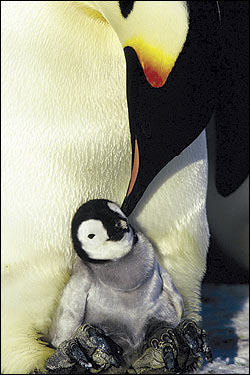Penguins are political. Although I haven’t yet seen March of the Penguins, it has a feathered family resemblance to Being Caribou and Deep Blue, both of which I’ve previewed for SIFF. All of them are disguised as Animal Planet–style nature porn, with pristine landscapes and plucky protagonists—all nonhuman—that I love. But make no mistake, all three films represent a new movement in the once-benign terrain of Marlin Perkins and Wild Kingdom. None is perfect, nor would I expect such of the world premiere of Earthling (which follows a family of globe-trotting naturalists), yet they’re radical in the Latin sense of the word: to the roots.
“You make a determination as to how beautiful that country is.” So sneers Dubya in Being Caribou about the Arctic National Wildlife Preserve (ANWR). So Canadian filmmaker Leanne Allison and her ranger husband, Karsten Heuer, take him up on his word: They follow the over 120,000 members of the Porcupine herd of caribou—named for a river—from the Canadian Yukon to their calving grounds some 900 miles northwest in Alaska’s ANWR wilderness. And back. Traveling by foot and ski, braving some scary-close grizzlies, their exhausting journey lasts about four months. Along the way, they lug a little George W. Bush action figure—or is it a voodoo doll?—strapped to a 60-pound pack. For this free-riding toy, it’s as easy as driving his SUV around the ranch in Crawford, Texas. For Allison, it’s part of what she calls “a bigger circle.” Our oil-dependent life cycle is connected to the herd, even if—as now seems inevitable—the U.S. Congress accedes to the Bush-Cheney plan for ANWR drilling.
The caribou Allison calls “humble perfect creatures” have their marine counterparts in Deep Blue, which is narrated by Pierce Brosnan. Of the fathomless ocean, 007 asks, “Will we exhaust its resources before understanding all its wonders?” Well, sure, as long as there are tuna to catch for our sandwiches and whales to slaughter for our dog food. It’s like the oil in ANWR, and the teeming schools of fish swarm into massive balls to avoid predators just like the caribou do to avoid wolves. Under threat, an ecosystem responds in predictable ways. Deep Blue isn’t very deep, but it has its grandeur. Even as you wish for Bill Murray to add some droll, non sequitur commentary as in The Life Aquatic, you recall that Jacques Cousteau did have a legitimate agenda beyond his own self-promoting and financing.
Which brings us to those emperor penguins, the canaries in the coal mine—if you will—of global climate change. Much as I’d like to see a bald and naked Dick Cheney sitting on his wife’s eggs for months during the Antarctic winter, slowly losing half his body weight to the brutal elements, I doubt the French March of the Penguins takes that approach. It probably inspires reverence, not outrage. Variety reports that actors actually give voice to the devoted penguin parents, like in Homeward Bound: The Incredible Journey; in translation, I could only wish that the mother be voiced by Angelina Jolie.
The problem with the rather bland, polite environmental sentiments articulated by Caribou‘s Allison and Blue‘s Brosnan is that—like all liberals—they can only speak in the language of victimhood. The politics essentially consist of a pretty picture that says, “Look, this will all be destroyed if you keep driving your kids to soccer practice in your Lincoln Navigators.”
Where is the anger? Where is the outrage? Allison and company are all very nice, but not very compelling. I think eco- documentaries are waiting for a new face, some combination of Grizzly Adams and Michael Moore, someone willing to couple Jackass stunts with Greenpeace tactics. Among recent docs, Morgan Spurlock probably came closest in Super Size Me, since the (junk) food we eat comes from agribusinesses that destroy our environment. MTV’s Trippin has a green-friendly star in Cameron Diaz, but I can’t see her shaming gillnetters or clear-cutters.
Yes, all four of these films will be valuable in raising environmental consciousness, but how much more of that does evergreen Seattle really need? Even as we worry about their plight, it’s time for the emperors to strike back.
Being Caribou: Broadway Performance Hall, 6:45 p.m. Fri., June 3; and 2 p.m. Tues., June 7. Deep Blue: Egyptian, 11 a.m. Sat., June 4; Neptune, 7:15 p.m. Mon., June 6. Earthling: Neptune, 7:15 p.m. Thurs., May 26; and 11 a.m. Sat., May 28. March of the Penguins: Harvard Exit, 6:30 p.m. Sat., June 11; and 11:30 a.m. Sun., June 12.








